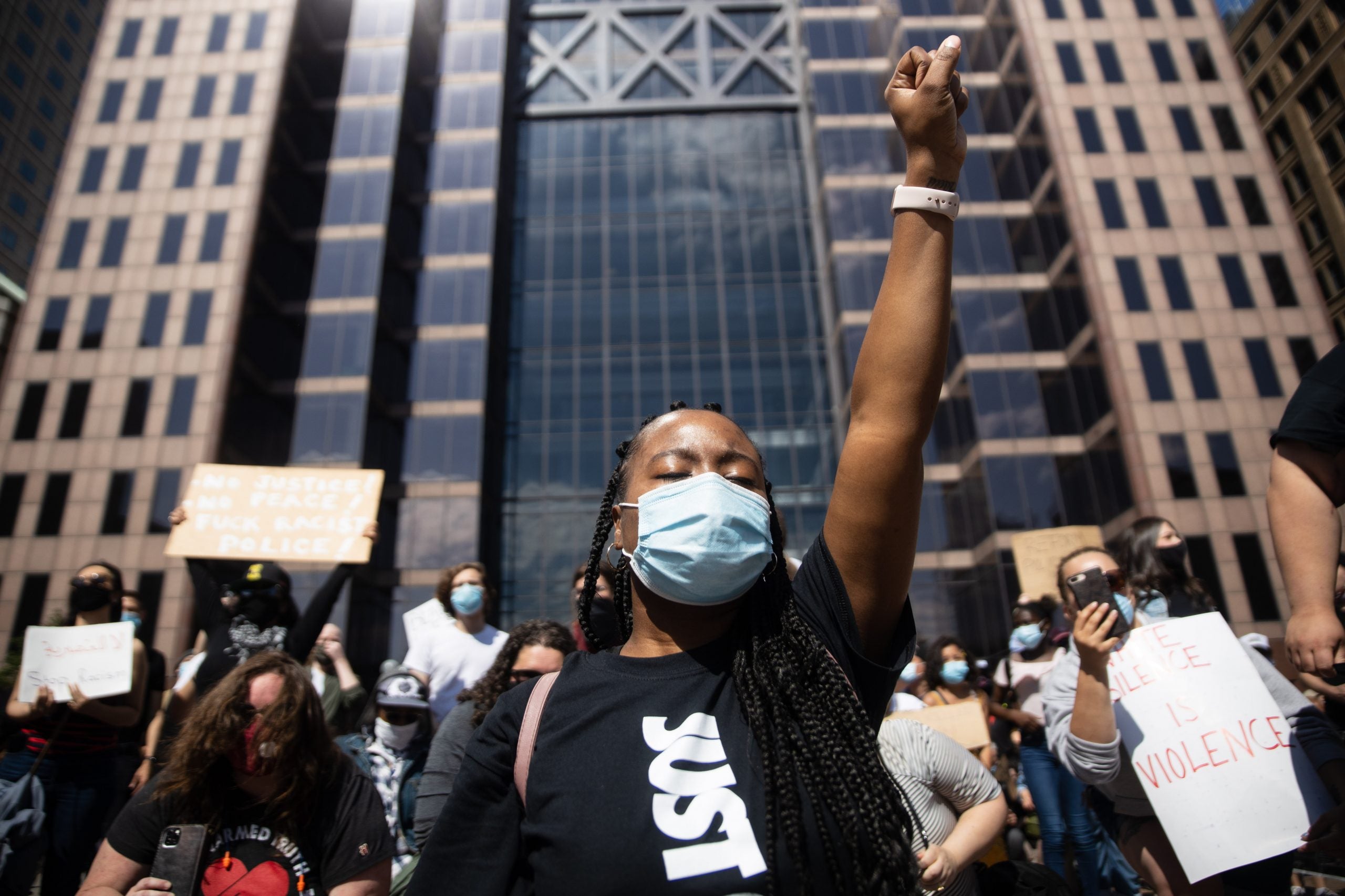
As protests continue to roil the nation following a spate of police and vigilante killings of Black people, many lawmakers, civil rights leaders and advocates vow to fight along with the community for new laws and systemic reforms.
“America is raw and her wounds are showing,” said U.S. Senator Kamala Harris (D-CA), who recently joined fellow Senator Cory Booker (D-NJ), and Congressional Black Caucus (CBC) Chair, Rep. Karen Bass (D-CA) for a virtual meeting with some of the country’s civil rights and racial justice advocates.
The National Urban League’s President/CEO Marc Morial convened Monday’s virtual meeting. Rev. Al Sharpton of the National Action Network (NAN); Derrick Johnson of the NAACP; and Sherrilyn Ifill, President and Director-Counsel of the NAACP Legal Defense and Educational Fund (LDF) joined. So did Melanie Campbell of the National Coalition on Black Civic Participation; Kristen Clarke of the Lawyers’ Committee for Civil Rights Under the Law; and Vanita Gupta of The Leadership Conference on Civil and Human Rights.
“The tragic and senseless loss of Black lives to police-involved violence, and the callous indifference to justice in response, should have been enough to persuade the nation of the need for dramatic change,” the group said in a joint statement. “The last several days have made it impossible to ignore.”
The leaders lamented that Black communities “already saturated in grief over the COVID-19 pandemic,” have now been “pushed to the brink by relentless police brutality and vigilante injustice.” Alluding to protests nationwide–largely peaceful, others with violence, looting and vandalism, they blamed “White nationalists” intent on stoking division. Critics say police in some cities have escalated unrest, and President Donald Trump has fanned the flames.
This comes as relatives and strangers grieve George Floyd, Breonna Taylor and Ahmaud Arbery–the latest Black victims of countless deadly police encounters.
“Blackness continues to put a mark on our backs,” said Judith Browne Dianis, Executive Director of the Advancement Project, which promotes fair democracy. “The police continue to believe that Black lives do not matter.”
In February, Ahmaud Arbery, 25, was shot and killed in Georgia after being chased by a White father and son who’d allegedly accused him of burglary and deputized themselves; the slaying was caught on video.
In March, Breonna Taylor of Kentucky was reportedly shot eight times by Louisville Metro Police Department officers while asleep in the apartment she shared with her boyfriend. “We can’t change people’s hearts, but we can certainly demand that their behavior be changed,” Sadiqa Reynolds, president of the Louisville Urban League, told Essence.
George Floyd, 46, was arrested in May by Minneapolis police officers, one of whom was captured kneeling on the dying man’s neck while ignoring pleas of “I cannot breathe.” The words echoed those of Eric Garner who died during a police chokehold on Staten Island in 2014.
The same day as Floyd’s death, a Black male birdwatcher in New York’s Central Park used his cell phone to record a White woman calling 9-1-1 after he requested she leash her dog.
The chasm between law enforcement and communities they are sworn to protect requires a systemic overhaul, say many. Civil rights leaders aim to work with bipartisan members of Congress, and want a broad review and revision of police training procedures, hiring standards, use of force policies and other reform measures. “We have so much work to do,” said Booker.
The CBC is crafting a multifaceted approach. “We have to end this,” said Chairwoman Bass. On Friday June 5, they’ll host a virtual Town Hall “Living While Being Black in America.”
A virtual briefing by the Democratic Caucus on Tuesday drew nearly 100 participants including members of Congress, advocates and stakeholders such as the National Organization of Black Law Enforcement Executives (NOBLE) and the Center for Policing Equity.
House Judiciary Committee Chairman Jerrold Nadler (D-NY) announced that they’ll hold a hearing next week on police brutality. The committee has sent a letter to the Department of Justice headed by U. S. Attorney General William Barr, demanding investigations into the Arbery, Taylor and Floyd deaths.
Many Black lawmakers including Rep. Hakeem Jeffries (D-NY) and Rep. Gwen Moore (D-WI) and Rep. Robin Kelly (D-IL) have or plan to sponsor legislation around policing issues. Kelly urged folks to contact legislators, special interest groups and funders. If elected officials don’t support reform? “Vote them out,” she said.
Sustained action is key, say advocates. Monifa Bandele is part of the policy table leadership team for the Movement for Black Lives, via her work with Malcolm X Grassroots Movement.
“From protesting in the streets to art murals to mutual aid coordination and economic boycotts, we will not rest until there is justice for all. When we say Black Lives Matter, we mean it in every way.”
The NAACP has launched a campaign entitled #WeAreDoneDying. The racial justice group Color of Change urges support of local bail funds for protestors, and removal of GoFundMe campaigns for former Minnesota officer Derek Chauvin and others.
Meanwhile, the civil rights community is calling for a National Day of Mourning on Thursday, June 4, when Floyd’s funeral is scheduled at North Central University in Minneapolis. Rev. Sharpton is to deliver the eulogy and attorney Benjamin Crump, who represents the family, will be among those offering remarks. Crump told Essence while convicting officers who commit crimes is tough, it’s not impossible to win cases. “You learn a little more from each one of them,” he said.
People across America are being asked to spend Thursday in reflection and prayer for racial reconciliation, and an end to violence. “We’ve gotta seize this moment to change the times,” said Sharpton.
